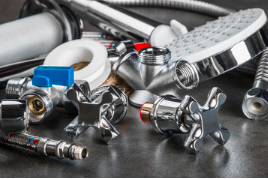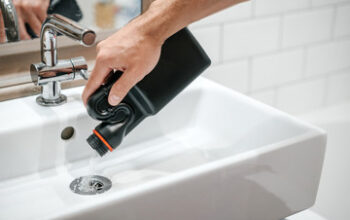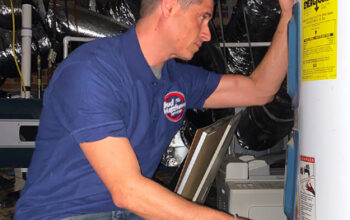Plumbing is a broad field used in numerous applications, including conveying fluids. Pipes, plumbing fixtures, valves, tanks, and other apparatuses are used to accomplish this. Here’s a basic overview of the field. For more information, read on. We’ll also cover codes, tools, and more. Here are some things to know before you begin your career in the plumbing industry. The best place to learn more is at a local college or technical institute.
Overview
 An overview of plumbing is a useful starting point for any student or professional interested in learning more about plumbing. Plumbing is an engineering field that has faced several challenges throughout the 20th century, with a focus on water conservation. As the need for water resources continues to increase, it is vital to develop plumbing solutions to reduce water usage. This is particularly important in developing countries, where over-watering is a major tax.
An overview of plumbing is a useful starting point for any student or professional interested in learning more about plumbing. Plumbing is an engineering field that has faced several challenges throughout the 20th century, with a focus on water conservation. As the need for water resources continues to increase, it is vital to develop plumbing solutions to reduce water usage. This is particularly important in developing countries, where over-watering is a major tax.
The basic physics of plumbing is similar in Sydney and Seattle. In general, free-surface flow is multi-phase, carrying both solid material and entrained air. While plumbing is universal, plumbing codes differ widely from one country to another. The European Community has struggled to develop a uniform plumbing code. However, the process is fundamentally the same, making it important to understand and follow state-specific codes when installing plumbing systems. In addition to these, plumbing systems can vary significantly in size and shape.
Don Arnold is the plumbing product guru. His college-level manual is a great way to learn more about plumbing. It is written in conversational English and includes detailed illustrations. Each chapter contains a quiz at the end of each chapter to assess your knowledge of plumbing. In addition, the course has links to individual sections for easy reference.
Public health is a critical issue for plumbing. In addition to the environment, plumbing systems must not cause any health risks to users or areas near them. They also have to be free from foul odors. This includes drains, sewers, and water lines. Keeping your home and family safe is crucial, so learning about plumbing will provide you with the necessary information you need to make your home safer and more comfortable. You can start your plumbing career today!
Components
A plumbing system is a series of pipes, valves, and fixtures that transport water. These components include the water supply system, faucets and sinks, sanitary drainage, and stormwater drainage. Water supply pipes, on the other hand, transport water from the faucets and sinks to the sewer system. Water is then routed through a series of drain pipes to the sewer system. While these pipes rely on gravity to move water, they are still a vital part of the plumbing system.
The plumbing system in your home is crucial for your standard of living. Without it, you would be unable to shower, use the toilet, wash utensils, or run a washing machine. Yet, most people aren’t even aware of the plumbing system’s components. All they do is turn a handle or push a button and expect a strong stream of water. But there are a lot more complex components to plumbing than you may realize.
A common plumbing component is a plug or cap. This part is used to close off a pipe opening when repairing or inspecting it. Plugs have two types of threads, one male and one female. A cap screws onto a male thread on a pipe. Different types of caps and plugs are used to fit different types of pipes. Valves are another important component in a plumbing system. They regulate the flow of fluid and are made of different materials.
Codes
If you have ever tried to do some plumbing work, you will know that it’s never as easy as it looks. Plumbing is a complicated process that can easily become a nightmare for even the savviest DIYer. To prevent damage and accidents, plumbing should always be done according to the correct codes. Plumbing codes are set in place to protect the general public and the residences in which they are being done. In addition, some of these codes protect the consumer as well.
Plumbing codes are important because they ensure the safety of both homeowners and plumbing contractors. While the codes may seem a bit complicated, they can also make the job simpler for plumbers and homeowners. Among other things, plumbing codes require that cleanouts be provided along the pipes for easy cleaning and augering in case of a clog. They also require the installation of access panels for future work. The National Plumbing Code covers drainage fixtures, potable water, venting, and traps.
Aside from the National Plumbing Code, there are several other plumbing codes you should be aware of. The International Plumbing Code (IPC) is the most widely used code. It sets requirements for plumbing and sanitation in a building and focuses on protecting the health of occupants. Appendices to the IPC provide further details. Further, it is used in more than 35 states and many other places.
In order to ensure safety and compliance, pipes and fittings should be third-party certified. In addition to that, the plumbing system must be connected to a sanitary drainage system. This section does not apply to indirect waste systems. If there is no sanitary drainage system, the building must provide a way to dispose of waste in the plumbing system. And in case of a leak, it should be fixed immediately. The proper installation of plumbing fixtures can save a lot of money and headaches.
Tools
Among the many plumbing tools that you will need is a plunger. This tool will help you open a clogged drain. Simply insert the plunger into the drain until it pushes out the blockage. However, if the clog is very difficult to remove with a plunger, you may need to use a snake as well. Plumbing tools for repairing leaks can include PEX piping. This material is usually made of synthetic rubber and was invented in the 1970s. It is flexible and less prone to breakage than metal pipes.
A screwdriver is one of the most basic plumbing tools. These tools are essential for bending and cutting pipes. They are compact and come with a three-sided handle that gives you leverage to achieve maximum torque. The blades of the screwdriver are made of premium chrome molybdenum steel and are precisely sized to fit the pipes. The pipe cutter can be used on a variety of materials, such as soft copper, aluminum, brass, and more.
Apart from a wrench, plumbers should also have safety equipment. These include heat pads and heat shields for the plumber’s protection. Plumbing software can help plumbing businesses keep track of their jobs and inventory and even help them reduce the risk of accidents. These tools also help in improving the efficiency of the plumbing business. If you want to learn more about these tools, sign up for a free demo.
Another essential tool for plumbers is a hand auger. This tool can easily clear stubborn clogs, as it has a flexible metal wire and can be cranked by hand. An auger is a good tool for stubborn clogs, while a drain snake machine is more suitable for tougher clogs. Regardless of which tool you need to use, a plumber will always keep safety tools on hand, from a pair of gloves to a bucket to a sink.
Job security
Despite the negative perception that plumbers are unskilled, the profession offers good wages, significant career advancement opportunities, and a wide variety of work. Plumbing requires both physical dexterity and intelligence, and it can be challenging to work under pressure. In fact, many smart men have risen to ownership and management positions in the field. And if you’re a good worker, your career can continue for decades. Here are three reasons why plumbing is a good choice for job security.
First, the water industry is an integral part of our lives. Every business, home, and school utilizes some type of water or wastewater system. As the demand for these systems continues to increase, plumbing professionals are in demand. Moreover, the environmental and water standards in many areas are progressively stricter. Plumbing professionals are needed to ensure that these systems are functional and safe for people to use. As these issues are addressed, they can help the environment and promote public health.
Another factor that promotes job security is the lack of skilled labor in the industry. Skilled workers have several advantages over unskilled workers, who are easily replaced and paid less. However, plumbing service contractors are short on staff and are therefore unable to compete for high-end jobs. This has caused many plumbing service contractors to become unable to compete with other local companies, which means that they must recruit more candidates to fill vacancies.
The nature of the work itself can also offer job security. AI can handle many routine tasks, but plumbers can’t be replaced by machines. Most robots can only do physical tasks, and plumbers can’t replace the human judgment and expertise necessary for plumbing. In addition, the physical aspects of the job will always require human judgment and expertise, which is why the industry is highly sought-after. If you have what it takes, you can become a plumbing professional.


